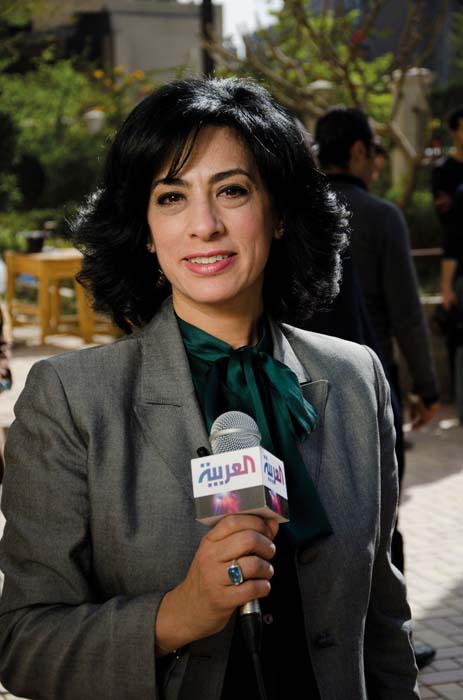 Photographed by Ahmad El-Nemr
For Randa Abul-Azm '91, Al
Arabiya channel's Cairo bureau
chief, January 25 did not
merely mark the onset of the
revolution, but it also initiated a new
a phase in her career. "I'm proud of
Al Arabiya being ranked as number
one, capturing 65 percent of viewers.
People would change the channel
immediately if they didn't think you
were credible," she said.
Abul-Azm established a career in
media in 1995. Upon the launch of Al
Arabiya in 2003, Abul-Azm was
appointed bureau chief of the
channel's offices in Cairo. Throughout
her career, Abul-Azm affirms that
maintaining credibility has always
been a top priority. "I never announce
information unless I am 100
percent sure," she said.
During the Egyptian
uprising, Abul-Azm was at the
forefront of events, and her
name became associated with
exclusive breaking news. Just
before Mubarak's address on
February 10, Abul-Azm was
the first correspondent to
reveal that the former
president will not be stepping
down. She was also credited
for reporting on statements
from the Supreme Council of
Egyptian Armed Forces even
before they were
communicated on air.
One of Abul-Azm's biggest
accomplishments during the
revolution was her interview with
Ahmed Ezz, steel industry tycoon and
former chairman of the Planning and
Budget Committee in the Egyptian
People's Assembly. "He was one of the
most controversial figures in the
regime," said Abul-Azm. "I had never
interviewed him or established
personal contact with him before.
When the revolution started, people
wanted to see this man and wondered
if he felt any guilt. It was very intense
and nerve-wracking. He had his
opportunity to admit his
shortcomings, but he didn't. I don't
think public opinion changed much."
With the country facing a
nationwide telecommunications
blackout, Abul-Azm found it difficult
to remain connected, but the scarcity
of communication means wasn't her
only challenge. "It was hectic and very
difficult, not only in terms of getting
news and information, but also the
amount of pressure was unbelievable,"
she said. "After the camel incident, our
office was shut for three days, and our
correspondents were assaulted. I didn't
see my family for three weeks. I was
constantly in a state of hiding because
I was subjected to the threat of being
attacked or detained."
When asked if she believed that the
media played a role in shaping
Egyptian history, Abul-Azm said she
believed the news dictated the
direction of the media and not the
reverse. "Media coverage played a
highly signficant role, and especially
new media because it helped us catch
up on any coverage that has been
missed," she explained. "Perspective
varied in each television station. There
didn't seem to be a homogenous
pattern within privately owned
channels; some were daring, others
were not. One of the major defects in
local media is that anchors tend to act
like analysts. Maintaining balance in
showing both sides of the story is
critical. In fact, it strongly factors into
how successful you become."
By Ghaydaa Fahim
|
